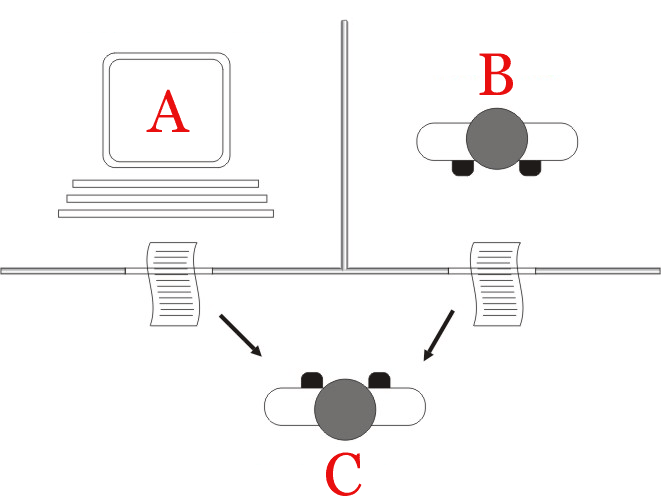|
Confederate Effect
The confederate effect is the phenomenon of people falsely classifying human intelligence as machine (or artificial) intelligence during Turing tests. For example, in the Loebner Prize during which a tester conducts a text exchange with one human and one artificial intelligence, artificial-intelligence chatbot and is tasked to identify which is which, the confederate effect describes the tester inaccurately identifying the human as the machine. The confederate effect is the reverse of the ELIZA effect, which Sherry Turkle states is humans' "more general tendency to treat responsive computer programs as more intelligent than they really are": that is, anthropomorphism, anthropomorphizing. The phenomenon was seen in the University of Surrey 2003 Loebner Prize for Artificial Intelligence, when both confederate (tested) humans, one male and one female, were each ranked as machine by at least one judge. More precisely, Judge 7 and Judge 9 ranked the female 'Confederate 2' as "1.00=def ... [...More Info...] [...Related Items...] OR: [Wikipedia] [Google] [Baidu] |
Turing Test
The Turing test, originally called the imitation game by Alan Turing in 1950, is a test of a machine's ability to artificial intelligence, exhibit intelligent behaviour equivalent to, or indistinguishable from, that of a human. Turing proposed that a human evaluator would judge natural language conversations between a human and a machine designed to generate human-like responses. The evaluator would be aware that one of the two partners in conversation was a machine, and all participants would be separated from one another. The conversation would be limited to a text-only channel, such as a computer keyboard and screen, so the result would not depend on the machine's ability to render words as speech. If the evaluator could not reliably tell the machine from the human, the machine would be said to have passed the test. The test results would not depend on the machine's ability to give correct question answering, answers to questions, only on how closely its answers resembled t ... [...More Info...] [...Related Items...] OR: [Wikipedia] [Google] [Baidu] |
Loebner Prize
The Loebner Prize was an annual competition in artificial intelligence that awards prizes to the computer programs considered by the judges to be the most human-like. The prize is reported as defunct since 2020. The format of the competition was that of a standard Turing test. In each round, a human judge simultaneously holds textual conversations with a computer program and a human being via computer. Based upon the responses, the judge must decide which is which. The contest was launched in 1990 by Hugh Loebner in conjunction with the Cambridge Center for Behavioral Studies, Massachusetts, United States. Since 2014https://blogs.exeter.ac.uk/exeterblog/blog/2014/12/08/the-loebner-prize-a-turing-test-competition-at-bletchley-park/ , ''The Loebner Prize, a Turing Test competition at Bletchley Park - The Exeter Blog'', Retrieved 8 December 2014 it has been organised by the AISB at Bletchley Park. [...More Info...] [...Related Items...] OR: [Wikipedia] [Google] [Baidu] |
Artificial Intelligence
Artificial intelligence (AI) is intelligence—perceiving, synthesizing, and inferring information—demonstrated by machines, as opposed to intelligence displayed by animals and humans. Example tasks in which this is done include speech recognition, computer vision, translation between (natural) languages, as well as other mappings of inputs. The ''Oxford English Dictionary'' of Oxford University Press defines artificial intelligence as: the theory and development of computer systems able to perform tasks that normally require human intelligence, such as visual perception, speech recognition, decision-making, and translation between languages. AI applications include advanced web search engines (e.g., Google), recommendation systems (used by YouTube, Amazon and Netflix), understanding human speech (such as Siri and Alexa), self-driving cars (e.g., Tesla), automated decision-making and competing at the highest level in strategic game systems (such as chess and Go). ... [...More Info...] [...Related Items...] OR: [Wikipedia] [Google] [Baidu] |
Chatbot
A chatbot or chatterbot is a Software agent, software application used to conduct an on-line chat conversation via text or Speech synthesis, text-to-speech, in lieu of providing direct contact with a live human agent. Designed to convincingly simulate the way a human would behave as a conversational partner, chatbot systems typically require continuous tuning and testing, and many in production remain unable to adequately converse, while none of them can pass the standard Turing test. The term "ChatterBot" was originally coined by Michael Loren Mauldin, Michael Mauldin (creator of the first Verbot) in 1994 to describe these conversational programs. Chatbots are used in dialog systems for various purposes including customer service, request routing, or information gathering. While some chatbot applications use extensive word-classification processes, natural language processing, natural-language processors, and sophisticated Artificial intelligence, AI, others simply scan for gene ... [...More Info...] [...Related Items...] OR: [Wikipedia] [Google] [Baidu] |
ELIZA Effect
The ELIZA effect, in computer science, is the tendency to unconsciously assume computer behaviors are analogous to human behaviors; that is, Anthropomorphism, anthropomorphisation. Overview In its specific form, the ELIZA effect refers only to "the susceptibility of people to read far more understanding than is warranted into strings of symbols—especially words—strung together by computers". A trivial example of the specific form of the Eliza effect, given by Douglas Hofstadter, involves an automated teller machine which displays the words "THANK YOU" at the end of a transaction. A naive observer might think that the machine is actually expressing gratitude; however, the machine is only printing a preprogrammed string of symbols. More generally, the ELIZA effect describes any situation where, based solely on a system's output, users perceive computer systems as having "intrinsic qualities and abilities which the software controlling the (output) cannot possibly achieve" or "ass ... [...More Info...] [...Related Items...] OR: [Wikipedia] [Google] [Baidu] |
Sherry Turkle
Sherry Turkle (born June 18, 1948) is the Abby Rockefeller Mauzé Professor of the Social Studies of Science and Technology at the Massachusetts Institute of Technology. She obtained an BA in social studies and later a PhD in sociology and personality psychology at Harvard University. She now focuses her research on psychoanalysis and human-technology interaction. She has written several books focusing on the psychology of human relationships with technology, especially in the realm of how people relate to computational objects. Her latest book 'Empathy Diaries' her memoir received fair critical reviews. Writings In ''The Second Self'', she writes about how computers are not tools as much as they are a part of our social and psychological lives, writing that technology "catalyzes changes not only in what we do but in how we think.” She goes on using Jean Piaget's psychology discourse to discuss how children learn about computers and how this affects their minds. ''The Second ... [...More Info...] [...Related Items...] OR: [Wikipedia] [Google] [Baidu] |
Anthropomorphism
Anthropomorphism is the attribution of human traits, emotions, or intentions to non-human entities. It is considered to be an innate tendency of human psychology. Personification is the related attribution of human form and characteristics to abstract concepts such as nations, emotions, and natural forces, such as seasons and weather. Both have ancient roots as storytelling and artistic devices, and most cultures have traditional fables with anthropomorphized animals as characters. People have also routinely attributed human emotions and behavioral traits to wild as well as domesticated animals. Etymology Anthropomorphism and anthropomorphization derive from the verb form ''anthropomorphize'', itself derived from the Greek ''ánthrōpos'' (, "human") and ''morphē'' (, "form"). It is first attested in 1753, originally in reference to the heresy of applying a human form to the Christian God.''Oxford English Dictionary'', 1st ed. "anthropomorphism, ''n.''" Oxford University P ... [...More Info...] [...Related Items...] OR: [Wikipedia] [Google] [Baidu] |
University Of Surrey
The University of Surrey is a public research university in Guildford, Surrey, England. The university received its royal charter in 1966, along with a number of other institutions following recommendations in the Robbins Report. The institution was previously known as Battersea College of Technology and was located in Battersea Park, London. Its roots however, go back to Battersea Polytechnic Institute, founded in 1891 to provide further and higher education in London, including its poorer inhabitants. The university's research output and global partnerships have led to it being regarded as one of the UK's leading research universities. The university is a member of the Association of MBAs and is one of four universities in the University Global Partnership Network. It is also part of the SETsquared partnership along with the University of Bath, the University of Bristol, the University of Southampton and the University of Exeter. The university's main campus is on Stag Hi ... [...More Info...] [...Related Items...] OR: [Wikipedia] [Google] [Baidu] |





